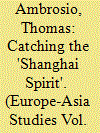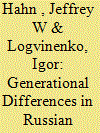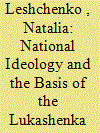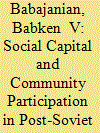| Srl | Item |
| 1 |
ID:
084441


|
|
|
|
|
| Publication |
2008.
|
| Summary/Abstract |
This article examines how the Shanghai Cooperation Organization (SCO) seeks to undermine democratisation in Central Asia. Prior studies of the interplay between international organisations and democracy have tended to examine only one half of this relationship: whether, how, and under what circumstances do international organisations promote democracy? However, the opposite has been largely ignored: how do international organisations sustain autocracy? Authoritarian governments are increasingly adopting policies aimed at preserving their political power and the SCO represents an additional strategy in this regard: utilising multilateral cooperation to defend themselves against regional or global democratic trends. As such, the 'Shanghai Spirit' may be a sign of things to come as autocratic leaders become more bold in their rejection of democratic norms.
|
|
|
|
|
|
|
|
|
|
|
|
|
|
|
|
| 2 |
ID:
084443


|
|
|
|
|
| Publication |
2008.
|
| Summary/Abstract |
The purpose of this article is to explore whether there is evidence of generational differences in Russian attitudes towards democracy. Are the attitudes, values and beliefs of those who came of age politically after the fall of the Soviet Union significantly different from those who did so in the Soviet period? The main finding is that the post-Soviet generation of Russians is generally more supportive of democratic values and institutions and a free market economy than the generations which came of age politically during the Soviet years. Such a result is not surprising. However, while support was found to be the case generally, the differences appear much more strongly for economic reforms than for political ones. In trying to explain why this should be, the authors argue that instrumentalist rather than culturalist considerations are paramount. Put another way, the current generation appears to be less interested in politics than in getting ahead in the world. If these differences are generational and not simply a function of aging, in the future this generation may be less interested in the public good than in their own.
|
|
|
|
|
|
|
|
|
|
|
|
|
|
|
|
| 3 |
ID:
084468


|
|
|
|
|
| Publication |
2008.
|
| Summary/Abstract |
The rule of Alyaksandr Lukashenka in Belarus has created one of the most resilient authoritarian regimes in post-communist Europe but the sources of its stability have not been clearly understood until now. The article suggests that President Lukashenka's authority is sustained on the basis of a national ideology, which he uses to drive his economic, social and foreign policies. The Belarusian transition reveals a new type of national mobilisation in the post-communist area: egalitarian nationalism. It is suggested that this ideology provides the principal source of the failure of democratisation and the authoritarian consolidation in post-Soviet states such as Belarus.
|
|
|
|
|
|
|
|
|
|
|
|
|
|
|
|
| 4 |
ID:
084706


|
|
|
|
|
| Publication |
2008.
|
| Summary/Abstract |
This article is based on in-depth interviews with migrants in different locations in Poland and the UK and explores Polish migrant decision making in both countries. In particular, we ask how migrants build networks, how this influences their decisions about the duration of their stay abroad, and the implications of network building for community cohesion. Networks exist within the sending country; between the sending and the receiving country; within diasporas; and between diasporas and the receiving community. Our article considers the first three sections of this chain.
|
|
|
|
|
|
|
|
|
|
|
|
|
|
|
|
| 5 |
ID:
084466


|
|
|
|
|
| Publication |
2008.
|
| Summary/Abstract |
Scientific, institutional and personal rivalries between three key centres of geographical research and scholarship (the Academy of Sciences Institute of Geography and the Faculties of Geography at Moscow and Leningrad State Universities) are surveyed for the period from 1945 to the early 1950s. It is argued that the debates and rivalries between members of the three institutions appear to have been motivated by a variety of scientific, ideological, institutional and personal factors, but that genuine scientific disagreements were at least as important as political and ideological factors in influencing the course of the debates and in determining their final outcome.
|
|
|
|
|
|
|
|
|
|
|
|
|
|
|
|
| 6 |
ID:
084439


|
|
|
|
|
| Publication |
2008.
|
| Summary/Abstract |
This article argues that the social capital framework used by development agencies in community-driven development projects in post-Soviet countries may not be adequate for analysing conditions affecting community participation. Research in Armenia shows that the availability of social capital in a community may not necessarily translate into participation. The governance environment plays a key role in affecting the nature and forms of community participation and in shaping local institutions in Armenia. The research argues against the 'cultural' view of institutional change, which presumes that the main barriers to participation are posed by cultural factors, such as interpersonal trust and the 'mentality' of post-Soviet citizens. Development interventions that focus on building social capital as a means to promote community participation may not be effective without addressing broader structural factors affecting participation
|
|
|
|
|
|
|
|
|
|
|
|
|
|
|
|
| 7 |
ID:
084464


|
|
|
|
|
| Publication |
2008.
|
| Summary/Abstract |
By applying a simple model of frontier production functions, this article shows that Hungarian small and medium-sized enterprises (SMEs) produce far below their feasible level, given their input endowment. The SMEs' under-production is rooted in the allocative inefficiency of small and medium-sized firms: they use labour in excess while they lack a sufficient level of capital assets. As a consequence of large inefficiencies, Hungarian SMEs improve profitability by scaling down production rather than by expansion.
|
|
|
|
|
|
|
|
|
|
|
|
|
|
|
|